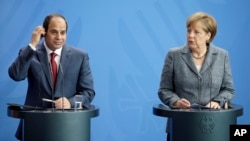Egyptian President Abdel-Fattah el-Sissi defended his government's human rights track record Wednesday, saying he was operating “amid very difficult circumstances” after Chancellor Angela Merkel criticized the country's widespread use of the death penalty.
In an unusually lively news conference for the generally staid Berlin chancellery after the two leaders met, members of the travelling Egyptian press corps clapped at times when el-Sissi spoke, while at the end a woman wearing a headscarf yelled in German “he is a murderer” as the two leaders left the room together.
Outside the building there was a similar scene, with a group of about 200 pro-el-Sissi demonstrators waving Egyptian flags and another similarly-sized group holding banners with slogans such as “no to dictator visit.” Police kept the two sides far apart.
El-Sissi, who overthrew his Islamist predecessor Mohamed Morsi following mass protests in 2013, has said Egypt must focus on stability and security in order to recover from years of turmoil unleashed by the 2011 uprising that toppled longtime autocrat Hosni Mubarak.
Since Morsi's ouster, the military-backed government has waged a sweeping crackdown on his supporters and jailed secular activists for taking part in unauthorized street protests. Those jailed include some of the leading secular and left-wing activists behind the 2011 uprising.
He told reporters in Berlin that though Morsi was democratically elected, the Egyptians who took to the streets in 2013 showed they wanted change “for a better future.”
“You must be reassured that we too in Egypt love freedom and democracy and we have fine human principles that we want to institute but amid very difficult circumstances,” he said. “We for sure have shortcomings in Egypt.”
He suggested without the removal of Morsi and the military intervention, violence among Egyptians would have spiraled into civil war.
“The Egyptian army has a special relation with its people,” el-Sissi said. “This army is part of this people, and moves with its pulse and protects it. It belongs to the people and not to any leader, starting from Mubarak, and until el-Sissi.”
Only hours before el-Sissi's arrival, a court said it would give its final ruling next week on a death sentence recently handed to Morsi.
Asked whether he would intervene, el-Sissi sidestepped the question saying that a death penalty had many stages and appeals, and if he were to take any measure it would have to be after exhausting litigation processes. Egypt's constitution allows the president to issue pardons after a ruling is final.
Merkel emphasized that even though she and el-Sissi disagreed on some issues, Egypt was a pivotal country in the Mideast and that her policy was to always keep dialogue open even when there are differences of opinion.
“We have to have an eye on the interests of regional security and stability, which is of great meaning for the security of Germany and of all of Europe,” she said.














